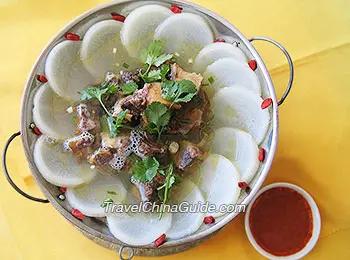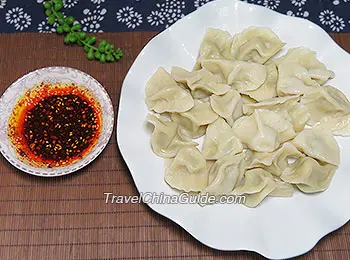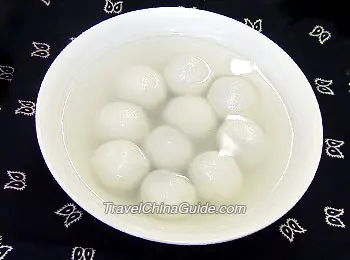6 Chinese Winter Solstice Foods to Warm You Up
Like other traditional festivals in China, Winter Solstice, or Dongzhi, also has some featured festival foods. After Winter Solstice, it will be colder and colder, so most Winter Solstice foods have the effects of warming body up and enhancing the cold resistance ability of the body. In Northern China, traditional Winter Solstice foods are mutton and dumplings, while southern people eat glutinous rice balls. The following are six most popular Winter Solstice foods Chinese people eat.
1. Dumplings
Dumplings are the most popular Winter Solstice food. In northern China, the dumpling has been eaten as Dongzhi festival food for thousands of years. In the area, there is a popular saying that eating dumplings in Winter Solstice can protect ears from frostbiting. The saying comes from a story about Zhang Zhongjing, a famous doctor in ancient China. He found that many people suffered from ear frostbiting in winter, so he wrapped mutton and Chinese medicine into the dough, boiled them and gave them off to people to cure the frostbite. It worked well and the custom has been passed down.![]() See more about Winter Solstice Folklore: 8 Stories in China
See more about Winter Solstice Folklore: 8 Stories in China
|
|
2. Glutinous Rice Balls (Tangyuan)
In southern China, Tangyuan is the most popular Dongzhi festival food. It is said that as early as the ancient Song Dynasty (420 - 479), the southern region had the custom of eating Tangyuan in the Winter Solstice. The implied meaning of eating Tangyuan is family reunion. The common stuffing of Tangyuan such as black sesame seeds and peanut can warm body up and enhance people’s resistance to the cold in winter according to Chinese medicine.
3. Wonton
It is a Winter Solstice food popular especially in Beijing and Suzhou. Like dumplings, the stuffing is wrapped with dough. It is always eaten with hot soup which helps body warm up soon in cold winter.
4. Mutton Soup
There are many places in the north where mutton is eaten in Winter Solstice. After the Winter Solstice, the weather is getting colder and colder, and the coldness in body increases and the body’s ability to resist coldness is weak. The calories of mutton are high and the content of iron is 6 times that of pork. According to traditional Chinese medical, mutton has a significant effect on hematopoiesis and can help warm body up.
The Eight Treasures Porridge is perfect for cold winter. The glutinous rice, jujube, walnut, peanut, chicken, mutton, longan, yam, white fungus are often added in the porridge. China medicine science believes that these ingredients can strengthen the spleen and warm the stomach, and protect the body against the winter coldness and dryness.
6. Daikon
 |
| Daikon |
A Chinese proverb has that daikon in Winter Solstice, ginger in Summer Solstice. Daikon helps enhance cold resistance ability. People usually use daikon and sparerib to make soup in winter.![]() See more about 10 Popular Chinese Foods to Warm You Up in Winter
See more about 10 Popular Chinese Foods to Warm You Up in Winter
Different Food Customs in China
Different places have different Winter Solstice food customs. Hangzhou people eat glutinous rice cakes, Cantonese people eat roasted meat, Xiamen jiangmu duck, and many places in the south glutinous rice mixed with red beans.![]() See more about
See more about
16 Special Winter Solstice Rituals in Different Places of China
Winter Solstice Celebration - How Do Chinese People Celebrate Dongzhi Festival?
Dongzhi Festival - Winter Solstice Festival Celebrated in China
Food Custom in Other Countries
In addition to China, many other countries celebrate Winter Solstice. But their foods for the festival are different. In Japan, people eat pumpkin to pray for luck in making money and red bean porridge; in South Korea, people have red bean porridge to exorcise evil spirits since they believe that devils are scared of red stuff; in Vietnam, people like a kind of round glutinous rice dumplings…
![]() See more about 10 Interesting Winter Solstice Traditions around the World
See more about 10 Interesting Winter Solstice Traditions around the World

